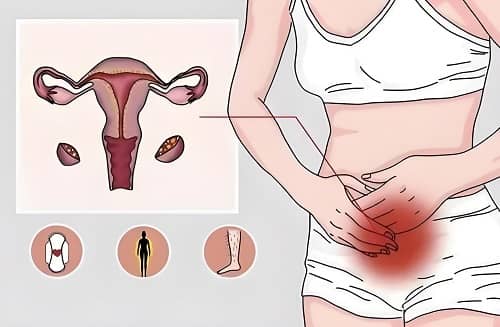Polycystic Ovary Syndrome (PCOS) is a common endocrine disorder that can manifest with a variety of symptoms at different stages of a woman’s life. Since each individual’s symptoms can vary, some may be subtle and harder to notice. Understanding the common signs of PCOS can help with early identification, allowing for timely management. Below are the common symptoms of PCOS:

Table of Contents
- 1. Irregular Periods
- 2. Ovulatory Dysfunction
- 3. Weight Gain or Difficulty Losing Weight
- 4. Hirsutism
- 5. Acne and Oily Skin
- 6. Thinning Hair or Hair Loss
- 7. Mood Swings
1. Irregular Periods
One of the most common symptoms of PCOS is irregular periods. Women may experience longer menstrual cycles, irregular periods, or even amenorrhea (no periods). This is due to hormonal imbalances that disrupt ovulation, causing unstable menstrual cycles. Many women will notice changes in their period cycles, especially when the intervals between periods become longer.
- Impact: Abnormal menstrual cycles, potentially leading to difficulties in conceiving.
- Mechanism: Hormonal imbalances lead to ovulatory dysfunction, which causes irregular periods.
2. Ovulatory Dysfunction
PCOS patients often experience ovulatory dysfunction. The ovaries may contain multiple small cysts (polycystic ovaries), which can prevent eggs from maturing and being released, leading to abnormal or absent ovulation. This is one of the leading causes of infertility in women with PCOS.
- Impact: Irregular ovulation, which can result in infertility.
- Mechanism: Abnormal ovarian function interferes with egg maturation and release.
3. Weight Gain or Difficulty Losing Weight
PCOS is frequently associated with insulin resistance, meaning the body has a reduced response to insulin, leading to elevated insulin levels and increased weight gain. Many women with PCOS find that, despite maintaining a healthy diet and exercise routine, losing weight or controlling body fat becomes very difficult.
- Impact: Weight gain or difficulty reducing body fat.
- Mechanism: Insulin resistance leads to metabolic issues and challenges in weight management.
4. Hirsutism
Elevated levels of male hormones (such as testosterone) can cause hirsutism, which is the growth of excess facial or body hair. This can occur on areas such as the face, chest, and abdomen. The increase in body hair not only affects physical appearance but can also negatively impact self-esteem.
- Impact: Excessive body hair that affects appearance.
- Mechanism: Increased male hormone levels lead to abnormal hair growth.
5. Acne and Oily Skin
Women with PCOS often experience elevated levels of male hormones, which can cause skin issues, particularly acne and oily skin. Acne is commonly seen on the face, back, and other areas, and oily skin can lead to clogged pores, worsening acne.
- Impact: Acne and oily skin, especially on the face.
- Mechanism: High levels of male hormones stimulate sebaceous glands, leading to acne and oily skin.
6. Thinning Hair or Hair Loss
Some women with PCOS may experience thinning hair or hair loss. This occurs due to elevated levels of male hormones, which affect the hair growth cycle, leading to slower growth or excessive shedding.
- Impact: Thinning hair and hair loss.
- Mechanism: Increased male hormones disrupt the normal hair growth cycle.
7. Mood Swings
Fluctuating hormone levels can also affect mood stability in women with PCOS. This may manifest as anxiety, depression, or other emotional disturbances. Some women may also feel fatigued, and prolonged symptoms can negatively impact their overall mental health.
- Impact: Mood instability, possibly accompanied by anxiety and depression.
- Mechanism: Hormonal imbalances impact the nervous system, leading to emotional fluctuations.
Early Recognition and Management
The symptoms of PCOS can vary from person to person. Early recognition of these symptoms and timely intervention can help alleviate the symptoms and improve the quality of life. If you experience similar symptoms, it is recommended to seek medical advice as soon as possible for a professional diagnosis and intervention. Appropriate management can help restore health and balance.